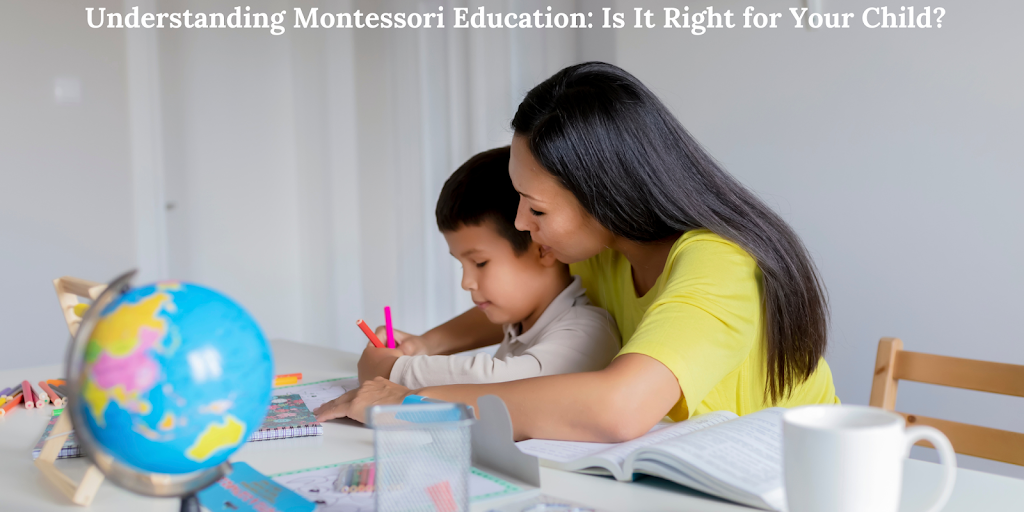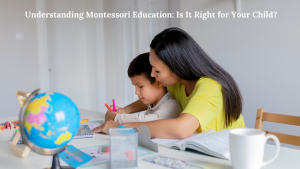Understanding Montessori Education: Is It Right for Your Child?
BEST CAREER COUNSELLOR FOR STUDENTS IN DELHI NCR
When it comes to choosing the best educational approach for your child, the options can be overwhelming. One popular method that has gained attention in recent years is the Montessori approach. But what exactly is Montessori education? And how do you know if it’s the right fit for your child? In this blog, we’ll explore the core principles of Montessori education, its benefits, potential challenges, and how to determine whether it’s suitable for your child’s needs.
Top career counseling for students in North Delhi: Rohini, Pitampura, and Shalimar Bagh
What is Montessori Education?
Montessori education is a child-centered approach to learning that emphasizes independence, freedom within limits, and respect for a child’s natural development. Developed by Dr. Maria Montessori, an Italian physician and educator, the Montessori method is based on the belief that children learn best when they are given the freedom to explore, ask questions, and engage with materials at their own pace.
The Montessori philosophy centers on the idea that children are naturally curious and capable learners. It provides an environment where children are encouraged to take initiative and responsibility for their own learning. Instead of traditional teacher-led lessons, Montessori classrooms are designed to be self-directed, with teachers serving as guides or facilitators rather than the primary source of information.
Key Principles of Montessori Education
-
Child-Centered Learning
At the heart of Montessori education is the belief that each child is unique and should have the freedom to learn at their own pace. Teachers observe and understand each child’s needs, interests, and learning style, tailoring the environment and activities accordingly. This individualized approach helps to foster a love of learning and allows children to progress at a pace that is comfortable for them. -
Learning Through Discovery
Montessori classrooms are filled with hands-on learning materials that allow children to explore concepts in a tangible way. These materials are carefully designed to encourage independent learning and problem-solving. For instance, a child might learn mathematical concepts by manipulating beads or learn about geography by assembling a puzzle of the world map. -
Prepared Environment
The Montessori environment is intentionally designed to support the developmental needs of children. Classrooms are orderly and thoughtfully arranged, with materials placed at a height accessible to children. This fosters independence, as children are able to choose their activities and work without relying on the teacher for assistance. -
Mixed-Age Groups
Montessori classrooms often have mixed-age groups, typically with children ranging from 3 to 6 years old. This allows younger children to learn from older peers, while older children develop leadership and mentoring skills. The multi-age setting promotes a sense of community and collaboration. -
Respect for the Child
Respect for the child is a cornerstone of Montessori education. Teachers treat children with respect and acknowledge their ability to make decisions, solve problems, and contribute to their learning environment. This creates an atmosphere of mutual trust and encourages children to develop confidence and autonomy.
Best career counseling services in South Delhi: Hauz Khas, Saket, and Greater Kailash
Benefits of Montessori Education
-
Promotes Independence and Self-Motivation
One of the key benefits of Montessori education is its focus on fostering independence. Children are given the tools and support to make choices, solve problems, and manage their learning experiences. This builds self-confidence and a sense of responsibility that carries over into other areas of life. -
Cultivates a Love of Learning
Montessori classrooms are designed to spark curiosity and engagement. Children are free to explore topics that interest them, which leads to a deeper, more intrinsic motivation to learn. The emphasis on hands-on learning and self-directed activities encourages children to actively participate in their own education. -
Nurtures Social and Emotional Development
The mixed-age setting of Montessori classrooms provides opportunities for social interaction and collaboration. Children learn how to work with others, negotiate, and resolve conflicts. Teachers emphasize emotional intelligence, helping children understand their own feelings and the feelings of others. This creates a strong foundation for empathy, communication, and interpersonal skills. -
Encourages Critical Thinking and Problem-Solving
Montessori education encourages children to think critically and solve problems on their own. Rather than providing direct answers, teachers guide children to explore, ask questions, and come up with their own solutions. This approach helps develop a growth mindset, where children understand that learning is a process that involves trial and error. -
Focus on Holistic Development
Montessori education takes a holistic approach, addressing the intellectual, social, emotional, and physical development of the child. By engaging in practical life activities, children develop fine motor skills, coordination, and concentration. These activities, such as pouring water, tying shoes, and preparing snacks, contribute to the overall development of the child.
Best career counseling services in West Delhi: Janakpuri, Rajouri Garden, and Punjabi Bagh
Challenges of Montessori Education
While Montessori education offers numerous benefits, it may not be the right fit for every child. Some potential challenges include:
-
Requires a High Level of Self-Discipline
Montessori education places a significant emphasis on independence and self-direction. Some children, particularly those who thrive in more structured environments, may find it challenging to adapt to the level of autonomy required in a Montessori classroom. These children may need additional guidance and support to develop the self-discipline necessary for success in a Montessori setting. -
Less Traditional Structure
Montessori classrooms do not follow a traditional schedule of subjects, such as math, language arts, and science. Instead, children engage in activities that incorporate multiple subjects in a more fluid and integrated way. For parents who are accustomed to a more structured, subject-based approach, this may seem unconventional. Additionally, some children may struggle with the less predictable routine and may prefer a more structured environment. -
Limited Availability of Montessori Schools
Montessori schools can be harder to find, depending on your location. They may also be more expensive than traditional schools, making them less accessible for some families. The number of Montessori schools can also be limited, and finding a well-established school that adheres to authentic Montessori principles may require careful research. -
Not Ideal for Every Child’s Learning Style
While many children thrive in a Montessori environment, some may find the level of freedom overwhelming or struggle with the independence required. Children who need more structure or who have difficulty focusing may find it challenging to work in a less directive environment. Parents should carefully consider their child’s personality and learning style when deciding if Montessori is the right fit.
Is Montessori Education Right for Your Child?
When considering whether Montessori education is right for your child, it’s important to evaluate their individual needs, temperament, and learning style. Here are a few factors to consider:
-
Is your child independent? Montessori education encourages self-directed learning. If your child enjoys exploring on their own and is capable of making decisions, Montessori may be a great fit.
-
Does your child enjoy hands-on activities? Montessori classrooms are filled with tactile, hands-on materials that children can manipulate to understand abstract concepts. If your child enjoys working with their hands, a Montessori approach might engage them in ways that traditional methods do not.
-
Does your child need structure or freedom? Some children thrive in structured environments with clear rules and routines. Others prefer the freedom to explore and take ownership of their learning. Consider which environment your child might feel most comfortable in.
-
Is your child socially mature? Montessori emphasizes social interaction and collaboration in a mixed-age setting. If your child is open to working with peers of different ages and enjoys social learning, Montessori may be ideal.
-
Are you willing to embrace a different educational approach? Montessori education is not based on conventional grade levels, standardized testing, or traditional grading systems. If you are open to an alternative educational philosophy and are willing to engage in the process with your child, Montessori could offer a rich and fulfilling educational experience.
Best career counseling services in East Delhi: Laxmi Nagar, Preet Vihar, and Mayur Vihar.
Conclusion
Montessori education offers a unique and holistic approach to learning, focusing on independence, self-motivation, and respect for the child’s natural development. Its emphasis on hands-on learning and individualized instruction fosters a deep love of learning and prepares children for success both in school and in life. However, it may not be the right fit for every child, especially those who need more structure or who may struggle with the level of independence required.
Ultimately, the decision to choose Montessori education for your child should be based on a careful evaluation of their needs, personality, and learning style. If you believe that Montessori principles align with your child’s strengths and learning preferences, it could provide them with a strong foundation for academic and personal growth.
Choosing the right educational path is one of the most important decisions a parent can make, and understanding the Montessori method can help you make an informed choice that best supports your child’s development and love for learning.











